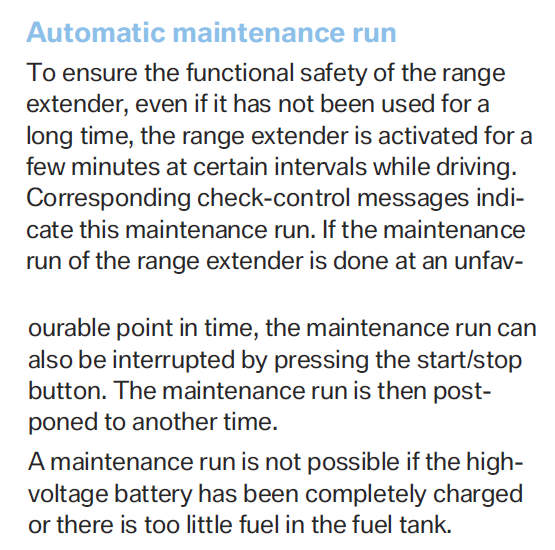You are using an out of date browser. It may not display this or other websites correctly.
You should upgrade or use an alternative browser.
You should upgrade or use an alternative browser.
Premium Fuel?
- Thread starter Paul1886
- Start date

Help Support BMW i3 Forum:
This site may earn a commission from merchant affiliate
links, including eBay, Amazon, and others.
RJSATLBA
Well-known member
Hi
Call me a sceptic but I tend to work on the principle that if it were true it wouldn't need to be claimed in adverts, word of mouth would have done the job better. My understanding is that premium fuels have a slightly higher octane rating which gives very small benefits on very high compression, high performance engines where the knock sensors would otherwise cut in towards the very edge of the performance envelope. If I am correct, one wouldn't expect this to be of any benefit on an engine that has already been de-rated.
Call me a sceptic but I tend to work on the principle that if it were true it wouldn't need to be claimed in adverts, word of mouth would have done the job better. My understanding is that premium fuels have a slightly higher octane rating which gives very small benefits on very high compression, high performance engines where the knock sensors would otherwise cut in towards the very edge of the performance envelope. If I am correct, one wouldn't expect this to be of any benefit on an engine that has already been de-rated.
LOL Sceptic! 
I think you are probably right, I've had a couple M3's and they always ran better on premium fuel but can't say I noticed any better mpg.... Er not that you really bother watching out for that in an M car.
Anyway hopefully have my own REx in a couple of weeks and will do some tests and post here if there is any improvement.
I think you are probably right, I've had a couple M3's and they always ran better on premium fuel but can't say I noticed any better mpg.... Er not that you really bother watching out for that in an M car.
Anyway hopefully have my own REx in a couple of weeks and will do some tests and post here if there is any improvement.
Lecram
Well-known member
As the use of the rex is limited, I don't think that there are any benefits for the i3.
I am waiting for the announcement from my electric supplier that they will supply premium current
I am waiting for the announcement from my electric supplier that they will supply premium current
tiburonh
Well-known member
Lecram said:As the use of the rex is limited, I don't think that there are any benefits for the i3.
I am waiting for the announcement from my electric supplier that they will supply premium current
Here in California the electricity providers have already found a way to play this game: you can pay extra if you want to get "clean" electricity (that has been generated through wind, soar, and thermal) instead of "dirty" electricity (generated from coal or gas burning).
I'm not sure how it is possible for them to send dirty and clean electricity out over the same wires and then separate them off at individual homes to those who are buying clean or dirty
ultraturtle
Well-known member
The only difference between lower and higher octane fuel is the amount of anti-knock additives to prevent detonation in high compression ratio engines. There is zero difference in the amount of useable energy per liter (or gallon). In an engine designed for lower octane fuel (lower compression ratio), there is no benefit to be gained by using higher octane. There is no risk of detonation, and no extra energy to be extracted from the fuel. A nuance comes into play when using a low octane fuel in an engine that was designed for a high octane formulation, like most modern BMW automobiles. In order to prevent the sort of severe engine damage that could otherwise occur from detonation, sensors in a modern automotive engine detect an impending detonation event and adjust the myriad engine parameters, to include timing, to dial back the power a bit to protect the engine.Paul1886 said:Just a thought has anyone done any tests to see if any better range on petrol can be had using premium fuel?..... The oil companies often try and claim up to 10% more which could be useful on i3 REx
The i3 REx has a high compression ratio engine designed for high octane fuel (Super with RON 95, RON 91 minimum). I do not have access to USA numbers for the BMW REx, but this equates to 91 octane recommended, 87 octane minimum in the States. The manual specifically warns "Do not fill up with petrol below the minimum grade indicated, otherwise the engine operation is not ensured." The manual does further state "The engine has anti-knock control. This means that different grades of petrol can be used." My guess is that this means it will accept a range of RON 95 to 91 (91 to 87 octane), perhaps detuning power a bit as octane decreases, but will not guarantee operation at any lower grade of fuel.
Bottom line is for us to use the proper fuel. It was designed for RON 95 (91 octane). In a pinch you can use as low as RON 91 (87 octane) with decreased performance (I would not recommend it), but use a fuel with lower octane, and there should be no expectation that the REx engine will operate at all.

$42.99
$49.99
Hi-Spec Tools 67pc SAE Auto Mechanics Hand Tool Kit Set. Complete Car, Motorcycle, Engine & Garage Repairs with Sockets, Ratchet Wrench, Pliers & More
Hi-Spec Products, Inc.

$59.99
$79.99
WORKPRO 12V Cordless Drill Driver and Home Tool Kit, Hand Tool Set for DIY, Home Maintenance, 14-inch Storage Bag Included
GreatStar Tools

$94.47
$100.00
BMW 51472450511 All-Weather Floor Mats for G01 X3 (Set of 2 Front Mats)
Irvine Eurocars

$169.99
$219.99
Arcwares 799pcs Aluminum Trolley Case Tool Set Silver, House Repair Kit Set, Household Hand Tool Set, with Tool Belt,Gift on Father's Day (Black)
Yizhiliha-Store
ultraturtle
Well-known member
Interesting. In USA standard is generally 87 octane (RON 91), midgrade is 89 octane (RON 93), and premium is 91 octane (RON 95). Looks like our premium fuel is the same octane as UK's standard, so I stand corrected. UK standard fuel is fine for the REx.Paul1886 said:... it seems UK fuels are RON 95 as standard and RON 97-99 for the premiums.Paul
One extra thing to consider is that unless you plan to use the fuel often, having a low grade cheap gasoline in the REX could create gummy stuff and mess-up the injection system. For US I would not go below 91 and also make sure I use a good brand (Shell, Exxon, BP) as they will always have better additives.
The think the irks me is the alcohol content. Sometimes there is more in the premium grades as it is a cheaper way than additives to increase octane. but alcohols can be a problem for seals and such. So if you have a gasoline source you know does not use alcohols, try using it. I could not find such in my area...
The think the irks me is the alcohol content. Sometimes there is more in the premium grades as it is a cheaper way than additives to increase octane. but alcohols can be a problem for seals and such. So if you have a gasoline source you know does not use alcohols, try using it. I could not find such in my area...
SanSerif
Well-known member
I'm barely using the REX[1]. Maybe 10 or 20 mile out of 850. And those could have been avoided by going slower.
Should I fire it up every now and then to keep it lubricated and prevent the fuel getting too old and manky?
[1] Or maybe I'm using it on every trip - as a psychological tool!
Should I fire it up every now and then to keep it lubricated and prevent the fuel getting too old and manky?
[1] Or maybe I'm using it on every trip - as a psychological tool!
No need, it does that automatically.SanSerif said:Should I fire it up every now and then to keep it lubricated and prevent the fuel getting too old and manky?
My reason for asking this question in the first place is that I have a 152 mile trip to make every 3 - 4 weeks which I think will be beyond what the REx can manage especially as most is motorway/freeway.... I was kind of hoping full tank of premium fuel and fully charged batteries may just get me there without refuelling..... but I think it unlikely.
Had my iBox installed yesterday..... it starting to feel real close now!
Paul
Had my iBox installed yesterday..... it starting to feel real close now!
Paul
ultraturtle
Well-known member
The manual states that "You can fill up with fuels with a maximum proportion of ethanol of 10%, i.e. E10". Luckily, 10% is the maximum allowed in the United States. While ethanol was a problem for internal engine and fuel line parts a decade or so ago, modern automobile engines use seals and other components that can tolerate a reasonable amount of ethanol.bxb40 said:...The think the irks me is the alcohol content. Sometimes there is more in the premium grades as it is a cheaper way than additives to increase octane. but alcohols can be a problem for seals and such. So if you have a gasoline source you know does not use alcohols, try using it. I could not find such in my area...
For those who plan to gas up only a few times per year, you may want to consider using a fuel stabilizer. Gasoline starts to go bad in just a month or two, gunking up fuel lines and the engine itself. Stabilizer products can extend the useful life of gasoline to a year or more.
kentheteaman
Well-known member
Plug said:No need, it does that automatically.SanSerif said:Should I fire it up every now and then to keep it lubricated and prevent the fuel getting too old and manky?
Hello Plug,
How often the Rex will fire up automatically if it is not used regularly?
regards,
ken
Hi Ken,kentheteaman said:How often the Rex will fire up automatically if it is not used regularly?
I'm not sure, the handbook is a little ambiguous about that. This is all it says.

kentheteaman
Well-known member
Plug said:Hi Ken,kentheteaman said:How often the Rex will fire up automatically if it is not used regularly?
I'm not sure, the handbook is a little ambiguous about that. This is all it says.

Hello Plug,
Thank you.
bxb40 said:One extra thing to consider is that unless you plan to use the fuel often, having a low grade cheap gasoline in the REX could create gummy stuff and mess-up the injection system.
Low octane doesn't mean low quality, it means it will ignite easier (prematurely, knock) when compressed than high octane fuel. Premium octane is no better quality than low octane fuel, the difference is in the anti-knock properties of the fuel. There is no reason for 87 octane to have any less shelf/storage life than 91.
Even Exxon makes no such claims, and they have reason too since they sell fuel. http://www.exxon.com/usa-english/gfm/fuels_quality_gas_faq.aspx
Using 10% Ethanol to boost the octane and the high octane fuel is actually cheaper than the lower octane fuel here in Iowa since Ethanol is cheaper than high octane gasoline. Ethanol subsidies have ended in the US.
Eric
Surge
Well-known member
Building on the last post, I cannot imagine any benefit to using 91 octane fuel in the REx. It's just charging a battery through an inverter/generator, remember.
ultraturtle
Well-known member
The benefit would arise from using the system as designed. BMW designed it for 91 octane gasoline. Although they allow for as low as 87 octane, use of any fuel rated less than 91 octane would need to rely on engine controls to adjust timing and generally degrade performance in order to prevent detonation and engine damage. Yes, you can use lower octane fuel, but that does not mean that you should.Surge said:... I cannot imagine any benefit to using 91 octane fuel in the REx. It's just charging a battery through an inverter/generator, remember.
Again, the manual states: "Do not fill up with petrol below the minimum grade indicated, otherwise the engine operation is not ensured." It further states "The engine has anti-knock control. This means that different grades of petrol can be used.""
Similar threads
Vehicle For Sale
2017 BMW i3 REX with Giga and Sunroof $14,199
- Replies
- 2
- Views
- 1K
- Replies
- 7
- Views
- 1K
- Replies
- 8
- Views
- 433




















![[Updated] 600W Power Inverter for Vehicles 12v to 110v, Dual DC to AC Car Inverters Converter Car Adapter for Wall Plug Outlet with USB C 65w/24W Fast Charge for Laptop Road Trip/Long Drive/Camping](https://m.media-amazon.com/images/I/41+ce37YsRL._SL500_.jpg)





















![300W Car Power Inverter DC12V to AC110V,Dc to AC Car Plug Adapter Outlet with Multi USB[24W USB-C] /USB-Fast Charger(24W) Car Inverter,Car Charger for Laptop Vehicles Road Trip PISIFAU](https://m.media-amazon.com/images/I/41+ox0CwBYL._SL500_.jpg)
